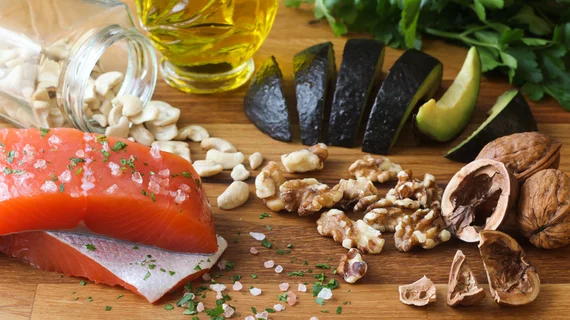Multiple studies in recent years have highlighted the cardiovascular benefits of the Mediterranean diet, which typically prioritizes eating fruits and vegetables and limiting fatty foods and animal products. According to a new analysis published in Stroke, following such a diet may also be associated with another key advantage: reducing the development of atherosclerosis.
For the study, the intima-media thickness of both common carotid arteries (IMT-CC) was evaluated in a total of 939 participants. Each individual was then randomly chosen to start a Mediterranean diet rich in monounsaturated fatty acids from extra virgin olive oil (EVOO) or a low-fat diet rich in complex carbohydrates.
The authors found that after both five and seven years, the Mediterranean diet substantially reduced IMT-CC compared to baseline. The low-fat diet, on the other hand, did not result in any change in IMT-CC over the same time period.
“The Mediterranean diet produced a higher decrease in IMT-CC and carotid plaque height, compared with the low-fat diet throughout follow-up,” wrote lead author Jose Jimenez-Torres, MD, a specialist at Reina Sofia University Hospital in Spain, and colleagues. “However, the Mediterranean diet did not exert any effect on the number of carotid plaques. The low-fat diet did not modify either IMT-CC or carotid plaque number and height after 5 and 7 years of follow-up.”
Jimenez-Torres et al. wrote: “These data would confirm that those patients with a high atherosclerotic burden might be the ones who benefit more from the dietary intervention,” the authors wrote.
The team noted that dietary changes such as embracing the Mediterranean diet may provide significant value to patients "with a high atherosclerotic burden."
“The current study is, to our knowledge, the first to establish an effective dietary strategy for secondary cardiovascular prevention, reinforcing the fact that the Mediterranean diet rich in EVOO could prevent the progression of atherosclerosis," the authors wrote.
Read the fully study here.
Find more content on diet and relation with cardiology:
Keto diet linked to potential nutritional, cardiovascular issues — do risks outweigh benefits?
Vegan diet associated with more weight loss, better cholesterol control than Mediterranean diet
Eating vegetables does little to prevent cardiovascular disease
Plant-centered diet tied to lower risk of CVD in young adults, older women
Plant-based diets boost cardiovascular health, lower risk of severe COVID-19
